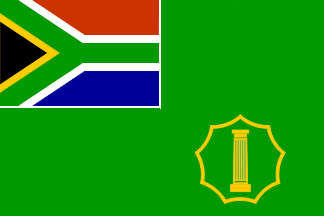js.gif) image by
Martin Grieve, 13 Jan 2004
image by
Martin Grieve, 13 Jan 2004
FOTW beschäftigt sich mit der Wissenschaft der Vexillologie (Flaggenkunde).
Alle auf dieser Website dargebotenen Abbildungen dienen ausschließlich der Informationsvermittlung im Sinne der Flaggenkunde.
Wir distanziert uns ausdrücklich von allen hierauf dargestellten Symbolen verfassungsfeindlicher Organisationen.
Last modified: 2015-05-02 by bruce berry
Keywords: national defence force | joint support division |
Links: FOTW homepage |
search |
disclaimer and copyright |
write us |
mirrors
 image
by Martin Grieve, 13 Jan 2004
image
by Martin Grieve, 13 Jan 2004
See also:
At a Retreat ceremony held on Friday 25 April 2003, the old
South Africa National Defence Force (SANDF) emblem, based on the Cape Castle outline,
was formally phased out. The old SANDF flag was lowered at the South African Air Force Gymnasium Parade Ground at 18h00. The new SANDF
emblem and flags were presented at a parade presided over by the Chief of the South African National Defence Force, General Siphiwe Nyanda, on
29 April 2003 at Defence Force Headquarters at Thaba Tshwane (formerly
Voortrekkerhoogte).
The change is another milestone in the transformation process in the SANDF and sees the replacement of the Cape Castle outline with a new
emblem. The new SANDF emblem incorporates a nine-pointed "Star" representing the warm sun of Africa and the nine provinces of
South Africa. The Star outline replaces the Castle outline and is also used in divisional emblems and flags to reflect a common corporate
identity coupled with a unique device for each Division. The four Services retain their respective traditional colours. The emblem also
reinforces the idea of military identity, authority and dignity.
The use of the green and gold are the traditional colours used to reflect the corporate identity of the Department of Defence. Green can
also be seen as referring to the natural wealth of Africa while gold can be seen as a reference to the mineral wealth as well as nobility and
purity.
Apart from the replacement of new emblems, the new SANDF,
Air Force, Army and
Medical Services flags are identical to their immediate
predecessors which have been in use since 11 November 1994 with the
exception of the South African Army which adopted a new flag in 2002. The South Africa naval ensign, which did not incorporate the emblem in
its post-1994 design, remains unchanged.
In addition to adopting new emblems on 29 April 2003, the SANDF also unveiled three new Divisional flags, namely those of
Joint Operations (CJ Ops), Defence Intelligence
and Joint Operations.
js.gif) image by
Martin Grieve, 13 Jan 2004
image by
Martin Grieve, 13 Jan 2004
The Joint Support Division is a senior division within the SANDF which previously did not have a flag of its own and this anomaly has now been
corrected. The new flag of the Joint Support Division has a "national
flag green" field with the national flag, fimbriated in white in the canton, and the badge of the division in the fly. The badge
comprises a yellow fluted pillar, symbolising support from a variety of disciplines, within a yellow nine-pointed star
outline. This flag was officially taken into use for the first time at a Defence Force parade held at Thaba
Tshwane on 29 April 2003.
Bruce Berry, 13 Jan 2004
The Joint Support Division within the South African National Defence Force (SANDF)
has disbanded and consequently the flag of Chief of Joint Support (CJ Ops) is no
longer in use. This flag was officially taken into use on 29 April 2003 and
lowered for the last time on 31 March 2006.
Bruce Berry, 14 Dec 2006
The description of the overall Defence Forces
emblem states: "The tusks are bound together by the four elements representing
Chief of Joint Operations (Chief of
Joint Operations, Chief of Joint Support, Defence
Intelligence and Chief of Corporate Staff)".
Will the number of binding elements now be reduced to three I wonder?
Nathan Lamm, 14 Dec 2006
Hosted by: Fanshop-Online.de und Handy-Shop.de
Tipp: Apple iPhone 12 im Shop